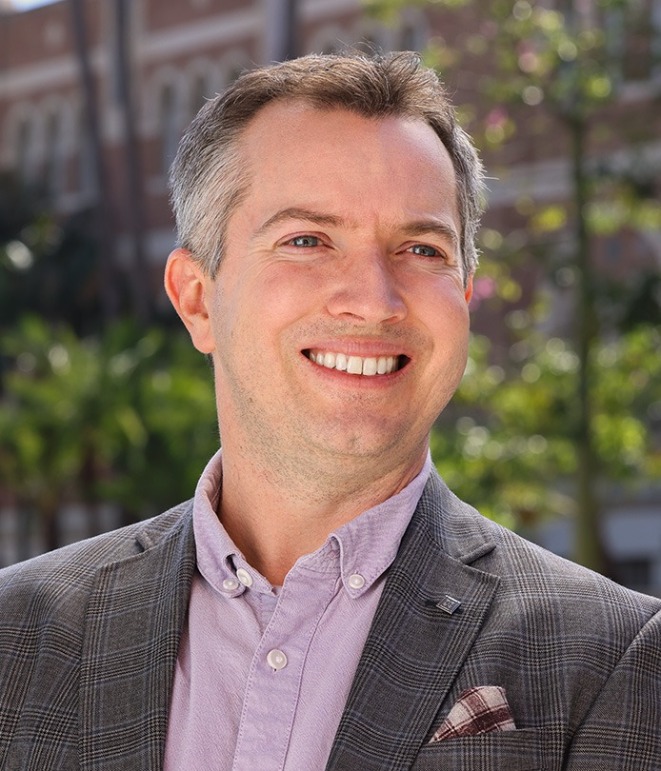
Artificial Intelligence Can Help New CEOs Drive Innovation
New research shows AI can be a strategic catalyst for innovation and creativity, especially during leadership transition.
Neuroscientist Teaches Students the Entrepreneurial Mindset
Neuroscientist Teaches Students the Entrepreneurial Mindset
Glenn Fox’s commitment to gratitude and empathy garners high regard from Marshall students.

For Glenn Fox, mindset is everything.
[USC Photo]
Glenn Fox has always been fascinated with mindset. Whether as a neuroscientist or in his current role as an assistant professor of clinical entrepreneurship at USC Marshall, Fox has striven to understand the mind through his meticulous research and passionate instruction. The efforts are paying off.
In recognition of his commitment to his students, Fox received the Marshall Award for Teaching Excellence.
“He’s hands-down the best professor I’ve had in undergrad,” said Hilal Balik MS ’25, who took Management of Small Businesses (BAEP 423) with Fox and was inspired to switch to Marshall.
Beyond the classroom, Fox’s research on gratitude, mindset, self-compassion, and self-awareness provide Marshall students the human tools they need to launch their companies and, ultimately, succeed.
Researching Mindset
While the study of entrepreneurship primarily focuses on the technical aspects of founding a business, Fox’s research centers on psychological components, specifically “entrepreneurial mindset.” That term refers to an outlook which enables founders to solve problems, tackle various situations with flexibility, and identify and capitalize on opportunities.
Through his work, Fox answers questions related to mindset, such as: How do founders handle pressure? How do they maintain a positive mindset? How can they handle stress?
His research on gratitude, specifically, has extended beyond the brain and into the workplace. According to Fox’s published case study, workplaces with a culture of gratitude enjoy higher employee satisfaction and engagement. In this way, the practice improves both psychology and productivity.
One of his two ongoing studies investigates the mindset that leads to high performance and entrepreneurial growth.
“It’s a longitudinal cohort-based study where students who have ventures come to our lab, and they do an interview about why they want to be a founder; what founding means to them; talk about their identity,” Fox explained.
Though the study’s conclusions aren’t yet final, Fox is already seeing patterns in the responses — or rather, a lack of patterns.
“There’s no one entrepreneurial mindset,” Fox said. “I've not found anything that says you've got to be this extroverted or that smart.”
A bored brain does not learn things.
— Glenn Fox
Assistant Professor of Clinical Entrepreneurship
On the contrary, Fox explains that his approach to researching and teaching entrepreneurial mindset is less about why students start companies and more so how they should. He focuses his lessons on ethical hiring practices, consideration for stakeholders, creating value in processes, and more.
In his second ongoing study, Fox is looking into the impact of stress on entrepreneurs. Together with his USC research assistants (Carson Folk MS ’23, Fiona Neville ’24, Valentina Veglia ’25, Kelly Cranston ’25, and Zoya Solaja ’25) he presents student founders with a series of stressors and some basic tools to relieve the tension. Then, the researchers monitor the subjects’ heart rates to determine what does or doesn’t work.
This study isn’t just about stressing out student founders. As a separate benefit, Fox introduces participating founders to potential investors to help launch their burgeoning businesses.
Between his research, instruction, and connections, one might think Fox was born to study entrepreneurship. However, his route to the classroom was anything but a straight line.
Film Sets and Neuroscience
Fox’s journey began, as so many Los Angeles careers do, on a film set. As a child actor, he was featured in multiple plays and films, including Back to the Future 3, in which he played “Boy with Gun.” Fox admits that his role didn’t require much skill, but he uses this personal experience as a lesson for his students.
“You never know,” Fox said. “You have to put yourself out there and give yourself permission before anybody else will. For entrepreneurs, that’s a really big thing.”
Fox didn’t pursue acting long term or even a degree in a business-related field. Instead, he enrolled in USC’s neuroscience PhD program.
His early research focused on gratitude’s effect on the brain. Unfortunately, his studies had to take a backseat when an unexpected tragedy struck his life.
His mother passed away from cancer. While processing the immense loss, he recalled speaking to his mother about her own gratitude journals and how much they helped through sickness. She alway found something to be thankful for.
“Notice the things that are still going well,” Fox recalled his late mother’s advice. “It doesn’t minimize how much pain these losses inspire. It’s showing that there’s a bigger picture and perspective to take.”
Soon after his mother’s passing, Fox was drawn to a new subject — the science of peak performance. He wanted to learn more about people who took great risks in their lives.
When a position at Marshall opened up for an assistant professor of clinical entrepreneurship, Fox jumped at the opportunity. Did he have much experience in the subject matter? No, but he hoped to figure out what made these risk-taking founders tick.
Into the Classroom
Like most entrepreneurs, Fox understands that life rarely goes as planned. Arriving at Marshall during a global pandemic, he taught his first entrepreneurship course over Zoom, marrying his passion for performing and teaching with his neuroscience background.
“It’s all based on the brain,” Fox said of his approach. “A bored brain does not learn things.”
Fox imbued his lectures with activities, open discussions, jokes, and stories — all a part of his teaching philosophy.
“If people are just there as passive receptacles of information, such a tiny percentage of that is going to land in their brain,” Fox explained. “We learn from stories, we learn from analogies and metaphors, and we learn from experience.”
The neuroscientist may be relatively new to the field of entrepreneurship, but his research has taught him the importance of mindset. Two of his classes, the Science of Peak Performance (BAEP 472) and Performance Mindset for Business (BAEP 572) enable students to handle personal challenges with innovative solutions and critical thinking.
“Ninety or 100 percent of success is determined by your mindset,” Fox said. “You’re not going anywhere if you can’t handle stress … If you don’t know how to manage yourself over the span of a hard career, then it doesn’t matter if you’ve got the perfect product.”
Fox’s neuroscience background may be unique at Marshall, but according to him, his human-first approach is not.
“We’re in the business of humans,” Fox said. “Other schools aren’t invested the way Marshall is in mindset.”
For his part, Fox hopes his contributions will lend students and founders much-needed support as they develop their entrepreneurial mindset and grow their new ventures.
RELATED
Artificial Intelligence Can Help New CEOs Drive Innovation
New research shows AI can be a strategic catalyst for innovation and creativity, especially during leadership transition.
Understanding Hidden Interaction Codes that Drive Business Success
A new study from Associate Vice Dean Peer Fiss and a former Marshall PhD students found that “category interaction codes” influence how consumers evaluate, buy, and use products.
Marshall Faculty Publications, Awards, and Honors: October 2025
We are proud to highlight the many accomplishments of Marshall’s exceptional faculty recognized for recently accepted and published research and achievements in their field.
AI Bottlenecks: A Q&A with Georgios Petropoulos on Obstacles to an Economic Boom
Assistant Professor Georgios Petropoulos discusses his research on artificial intelligence bottlenecks and the factors preventing the technology from catalyzing an economic surge.
Alumni Honor Founding MBV Director Robert Turrill with Commemorative Plaque
Through mentorship and commitment, the founding director of the Master of Business for Veterans’ program has inspired Trojans in and out of the classroom.